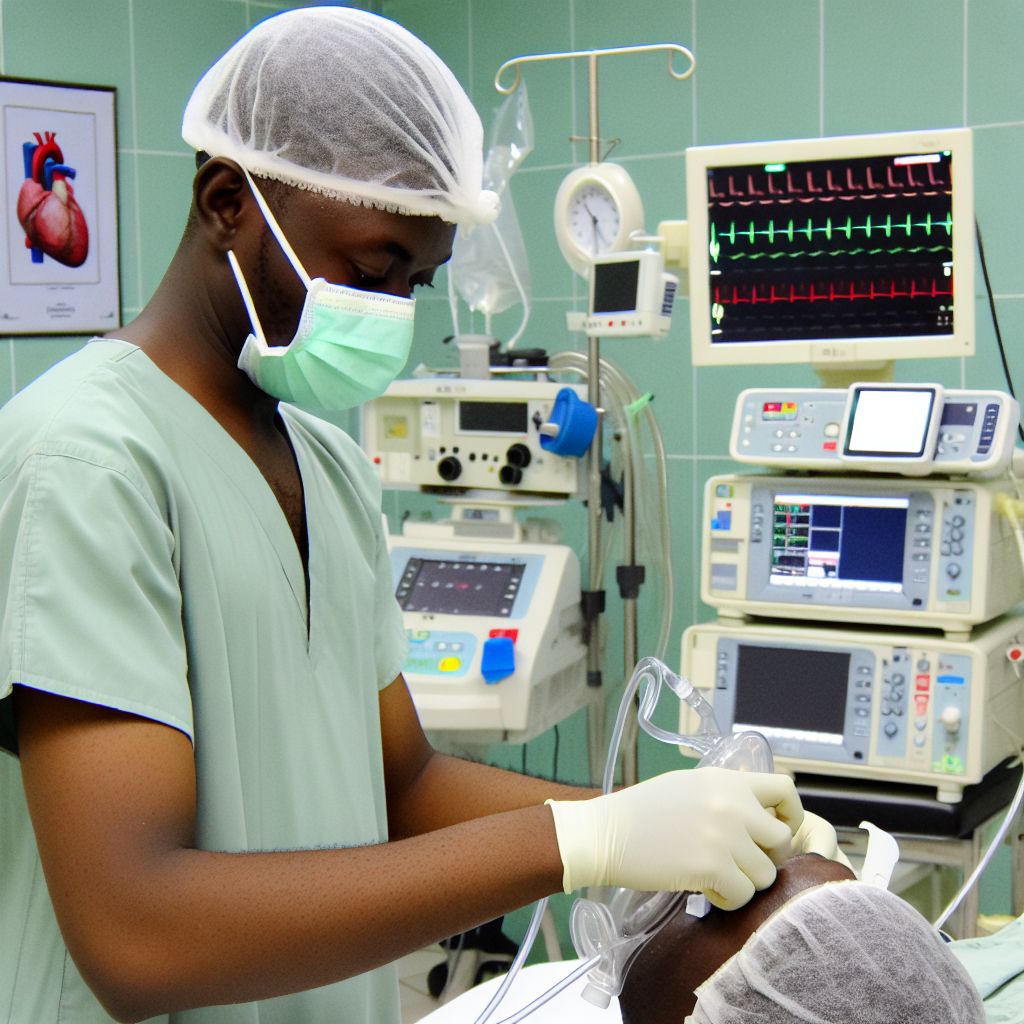Anaesthesiology: An Overview
In the field of anaesthesiology, doctors specialize in providing pain relief and administering anesthesia during medical procedures.
This is crucial as it ensures patient comfort and safety during surgeries and other interventions.
The role of anaesthesiologists in Nigeria is becoming increasingly significant.
This is due to the growing demand for surgeries and medical procedures across the country.
As healthcare facilities expand and technology advances, the need for skilled anaesthesiologists continues to rise.
Training and Education
To pursue a career in anaesthesiology in Nigeria, individuals typically need to complete a medical degree.
This is followed by a residency program in anaesthesiology.
This training provides hands-on experience in administering anesthesia and managing pain during various procedures.
Specialization and Certification
After completing their residency, anaesthesiologists can choose to specialize in areas such as pediatric anaesthesiology or pain management.
Obtaining certification from relevant professional bodies is often necessary to practice as a qualified anaesthesiologist.
Career Pathways
Anaesthesiologists in Nigeria have diverse career opportunities in hospitals and clinics.
They play a crucial role in surgical teams, pain management clinics, and critical care units.
Some also choose to work in research or teaching positions.
Job Outlook
With the increasing demand for surgeries and medical procedures in Nigeria, the job outlook for anaesthesiologists is promising.
They are essential members of healthcare teams and contribute significantly to patient outcomes and safety.
Anaesthesiology is a vital medical specialty that plays a crucial role in ensuring patient comfort and safety during medical procedures.
The field offers rewarding career pathways with opportunities for specialization and professional growth in the healthcare sector in Nigeria.
Educational Requirements for Anaesthesiology in Nigeria:
- Undergraduate medical degree
- Residency training in anaesthesiology
- Certification by the National Postgraduate Medical College of Nigeria (NPMCN)
To pursue a career in anaesthesiology in Nigeria, individuals must meet specific educational requirements.
These requirements are designed to ensure that anaesthesiologists are well-equipped to provide safe and effective anesthesia care to patients.
Undergraduate Medical Degree:
Prospective anaesthesiologists must first complete an undergraduate medical degree from a recognized medical school in Nigeria.
This degree provides the foundational knowledge and skills needed to practice medicine.
Residency Training in Anaesthesiology:
After obtaining an undergraduate medical degree, individuals interested in anaesthesiology must undergo residency training in the field.
This specialized training program typically lasts for a minimum of four years and involves hands-on clinical experience under the supervision of experienced anaesthesiologists.
Certification by the National Postgraduate Medical College of Nigeria (NPMCN):
Upon completing residency training, aspiring anaesthesiologists must seek certification from the National Postgraduate Medical College of Nigeria (NPMCN).
This certification process involves passing rigorous exams that assess the individual’s knowledge and competence in the field of anaesthesiology.
These educational requirements ensure that anaesthesiologists are well-trained and qualified to provide high-quality anesthesia care to patients in Nigeria.
Job Opportunities for Anaesthesiologists in Nigeria:
There are a variety of job opportunities available for anaesthesiologists in Nigeria.
Here are some of the common places where anaesthesiologists can work:
Hospitals and healthcare facilities:
- Public hospitals
- Private hospitals
- Specialist hospitals
- Medical centers
- Emergency care facilities
Private practices:
- Setting up a solo practice
- Joining a group practice
- Providing anaesthesia services in clinics
- Consulting for various healthcare facilities
- Offering home care anaesthesia services
Academic institutions:
- Teaching in medical schools
- Conducting research in anaesthesiology
- Supervising medical students and residents
- Participating in academic conferences and seminars
- Contributing to medical journals and publications
Anaesthesiologists in Nigeria have diverse job opportunities that allow them to work in different settings.
They make significant contributions to the healthcare sector.
Learn More: Scope of Biomedical Technology in Nigeria’s Healthcare
When pursuing a career in anaesthesiology in Nigeria, there are certain skills and qualities that are essential for success in this field.
Strong Medical Knowledge
- Understanding of anatomy, physiology, pharmacology, and other medical sciences is crucial.
- Being able to interpret medical charts and diagnose patients accurately is necessary.
- Continuous learning and staying updated with the latest advancements in anaesthesiology is important.
Excellent Communication Skills
- Effective communication with patients, their families, and other healthcare professionals is key.
- Being able to explain complex medical information in a clear and concise manner is essential.
- Listening actively and being empathetic towards patients’ concerns is crucial for providing quality care.
Ability to Work Well Under Pressure
- Anaesthesiologists often work in high-stress environments such as the operating room.
- They must remain calm and composed during emergencies and critical situations.
- Quick decision-making skills and the ability to prioritize tasks are vital for providing optimal patient care.
Possessing these skills and qualities will lead to success in anaesthesiology and ensure the well-being and safety of patients in Nigeria.
Gain More Insights: Radiography and Digital Imaging in Nigeria
Challenges Faced by Anaesthesiologists in Nigeria:
Anaesthesiologists in Nigeria often face challenges due to the lack of essential resources and equipment in healthcare facilities.
This shortage can hinder their ability to provide optimal care to patients during surgeries and medical procedures.
Without access to critical tools such as ventilators, monitoring devices, and medications, anaesthesiologists may struggle to ensure patient safety.
Another significant challenge faced by anaesthesiologists in Nigeria is the demanding nature of their work schedule.
They often work long hours, including night shifts and weekends, to ensure that patients receive the necessary care.
On-call duties further add to their workload, requiring them to be available at all hours for emergency cases.
Transform Your Career with Expert Guidance
Get personalized mentorship consulting that’s tailored to your unique path. Our expert advice is actionable and exclusive.
Get StartedMany people in Nigeria have limited knowledge about the vital role that anaesthesiologists play in healthcare.
This lack of awareness can lead to misunderstandings and misconceptions about the profession.
As a result, anaesthesiologists may not always receive the recognition and support they deserve for their critical contributions to patient care.
Find Out More: Rehabilitation for Spinal Cord Injuries Nigeria

Salary and Career Growth Opportunities in Anaesthesiology:
Average salary range for anaesthesiologists in Nigeria
Anaesthesiologists in Nigeria have a salary range of between ₦300,000 to ₦1,000,000 per month, depending on experience, location, and employer.
Opportunities for career advancement
There are various opportunities for career advancement in anaesthesiology in Nigeria.
Anaesthesiologists can choose to specialize in areas such as paediatric anaesthesia, cardiothoracic anaesthesia, pain medicine, and critical care.
Continuing education and training options
Continuing education is crucial for anaesthesiologists to stay current with the latest advancements in the field.
They can attend workshops, conferences, and seminars to enhance their knowledge and skills.
Additionally, pursuing postgraduate studies or certifications can open up new career opportunities.
Uncover the Details: Career Path in Oral and Maxillofacial Surgery in Nigeria
Importance of Anaesthesiology in Surgery and Medical Procedures:
- Role of anaesthesiologists in ensuring patient safety and comfort during procedures.
- Key responsibilities in monitoring vital signs and administering anesthesia.
- Collaboration with surgical teams and other medical professionals.
Anaesthesiology plays a crucial role in the field of medicine, especially during surgical procedures and medical interventions.
Anaesthesiologists are trained professionals who specialize in administering anesthesia to patients undergoing surgery or other medical procedures.
Their role is vital in ensuring the safety and comfort of patients throughout the process.
One of the most important aspects of anaesthesiology is patient safety.
Anaesthesiologists are responsible for ensuring that patients are properly sedated and pain-free during procedures.
They carefully monitor vital signs such as heart rate, blood pressure, and oxygen levels to ensure that the patient’s body is responding well to the anesthesia.
This constant monitoring helps prevent any potential complications that may arise during the procedure.
In addition to administering anesthesia and monitoring vital signs, anaesthesiologists also play a key role in collaborating with surgical teams and other medical professionals.
They work closely with surgeons, nurses, and other healthcare providers to develop an individualized plan for each patient.
This collaboration ensures that all members of the medical team are working together to provide the best possible care for the patient.
Anaesthesiologists are also responsible for managing pain control throughout the surgical process and post-operative care.
They work with patients to develop pain management plans that are tailored to their specific needs.
This includes the use of medications, nerve blocks, and other techniques to help alleviate pain and discomfort.
Anaesthesiology is a critical component of surgical and medical procedures.
Anaesthesiologists play a key role in ensuring patient safety and comfort during surgery, monitoring vital signs, and collaborating with other healthcare professionals.
Their expertise is essential in providing high-quality care to patients undergoing procedures, making them an indispensable part of the medical team.
Anaesthesiology Career Pathways in Nigeria
For aspiring anaesthesiologists in Nigeria, the career pathway is a rewarding journey.
This pathway requires dedication and commitment.
The first step is to complete a bachelor’s degree in medicine or surgery.
After obtaining the MBBS degree, graduates need to undergo residency training.
This training program in anaesthesiology typically lasts for 4-5 years.
During this period, they receive hands-on training in various aspects of anaesthesia.
Upon completing the residency program, aspiring anaesthesiologists can pursue further specialization.
They can obtain certifications in sub-specialties like paediatric anaesthesiology or cardiothoracic anaesthesiology.
This additional training enhances their skills and knowledge in specific areas.
Professionals in this field also have opportunities in academic positions or research.
Healthcare administration roles are also available to them.
Continuous professional development is essential in this career.
It helps them stay updated with the latest advancements in anaesthesiology.
The Importance of Anaesthesiology in Healthcare
Anaesthesiology plays a critical role in healthcare systems.
It ensures patient safety and comfort during surgical procedures.
Aspiring anaesthesiologists in Nigeria should persevere and strive for their career goals.
It is crucial for healthcare institutions and the government to support anaesthesiology.
Investing in training and resources can improve the quality of care provided to patients.
Together, we can elevate the standards of anaesthesia practice in Nigeria.
This effort will ensure a brighter future for healthcare professionals in this specialty.
Additional Resources
Academic Neurosurgery in Nigeria- Past, Present, and Future: A …
Practicing medicine in the U.S. as an international medical graduate




